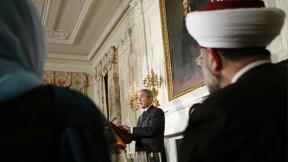
Listening is the best way to serve and a great way to learn. Listening Imams and Khateebs grow in knowledge and respect.
All Imams and Ameers are bound by Shura (consultation) as Allah has ordered in the Quran...wa Amruhuma Shura bainahum... And Shura is all about listening.
Our capacity to motivate Muslims, resolve conflicts and develop a team, all depend on how well we listen.
The more effectively we listen, the more we learn.
We might think we already know how to listen. But unfortunately, most of us pay little attention to the quality of our listening. We usually hear words without paying attention to them.
Marshall Goldsmith writes that, "80% of our success in learning from other people is based upon how well we listen” (BusinessWeek.com, 1/8/07).
When you are an Imam or a Khateeb, you talk. People ask a question, you talk. You perform marriages, you talk. You conduct funerals, you talk. Talking seems to be the main thing we end up doing. However, it is good listening which will enrich our talk and deliver us the most help we need to carry out our responsibilities.
Here are some suggestions for better listening:
Listen to yourself
One of my teachers, Rahimullah alaih (may God have mercy on him), would always ask himself before any speech: what are my motives?
This is where the Prophet’s teaching of Innamal a’malu bin niyyaat (verily deeds are by intention) comes in handy. We must always think of our motives before opening our mouths. This will bring in focus our sincerity which will reach our audience.
In his bestselling book, The Seven Habits of Highly Effective People, Stephen Covey’s first three habits essentially deal with listening to yourself.
We know ourselves better than anyone else after Allah. We should develop a habit of listening to our Nafs al-Lawwama. Taking it seriously will allow us to be a mirror to ourselves in privacy. The advice of Umar ibn al-Khattab of Haasaiboo qabla an tuhaasaboo, do your own accounting before you are asked on the Day of Judgment, is a winning strategy.
Action Items:
- If your Nafs al-Lawwama is not speaking to you nowadays, take a few minutes between your Sunnah and Fard Salah to think about your day.
- Just before you go to bed, think about your day. Say Alhamdu lillah for everything you found in good deeds and say Astaghfirullah for every wrong deed committed.
Do your eyes listen?
Always look into the eyes of the person you are listening to. Your eyes, along with your ears, should be focused on the person you are talking to. He will note this and will, insha Allah, remember that you are taking a genuine interest in what is being said.
Former U.S. President Bill Clinton is known for listening to a person as though he or she is the most important individual in the room. When I first met him at President Barack Obama’s inauguration, I was surprised to see how true this was. Although he did not know me, he was attentive and focused towards me, looking straight at me while there were dozens of people around us.
Action item:
- Just before you retire at the end of your long day, think about the faces of the people you met in the last 24 hours. Do you remember their names? What did they say to you? Was there anything you can take a note of? Was there anything new and useful that you learned?
- Take notes each time you are asked questions at the end of a class or lecture. The person asking will feel you are giving him or her importance.
- If questions are being asked in writing, collect all of the question slips and take them with you. Later on, read them and think about how you would have answered those inquiries. Take note of these answers and file them in a folder called “Question and Answer Sessions”. Refer back to these notes before making a presentation, since it’s common to come across the same types of issues in other settings.
Become a Why Imam
Nothing will connect you with Muslim youth more than attentive and respectful listening. The more you listen to them, the more they will listen to you.Listening is a process of empowerment.
Engaging youth in conversation, however, is not easy. One way to do this is to ask them questions in response to their question. This was something the Prophet Muhammad, peace and blessings be upon him, regularly did in his interactions with others. In one incident, a young man came to the Prophet asking him permission to commit Zina (sex outside of marriage). Instead of becoming angry and scolding him, the Prophet responded with a series of questions. He asked the youth, "Would you want someone else to commit adultery with your mother?" The youth responded with a no. The Prophet then repeated this question in relation to the young man’s sisters, aunts and other female relatives. The answer was always the same. At the end of this, he prayed for the young Muslim, who was now convinced of the ugliness of illicit sex.
Sometimes, it’s good to give young people a short answer before responding to their question. That way, you can inquire about their views. This shows respect and a genuine interest in the person.
Muslim youth are under tremendous pressure. According to a Gallup survey, young Muslims are the angriest of all youth groups in America. They are also the least happy as compared to Christian and Jewish youth. About 28% of Muslim students in New York report being stopped by police as a result of racial profiling; 29% of Muslim students sometimes use a non-Muslim sounding name to avoid pressure. Some of our youth are either leaving Islam, connecting with extremist groups or joining gangs.
It is very important for an Imam, therefore, to engage youth. The more he asks for their opinions, the more comfortable they will feel offering their views. And please don’t interrupt when your question is being answered!
Action items:
- Avoid routine questions like “how was school?” Youth are asked that question countless times. It means nothing to them. Start a conversation by asking about something meaningful.
- Here is a great article written by an 18-year-old which explains how younger people feel about the way adults talk to them.
- Read a book on youth development.
- Always make a Muslim youth in charge of a youth group instead of an uncle or auntie figure.
Learn about what’s new and what’s hot in youth culture
Do you know what kind of music youth are listening to? What television shows they are watching? What websites they are visiting? What kind of messages they are texting to each other on their cell phones? Do you know what they are talking about among themselves?
I am not encouraging you to spy on them or to indulge in Haram. Rather, I am emphasizing the need to understand their culture and gain a good grasp of the kind of media they are influenced by daily.
There are youth blogs and discussion boards that can provide you with some insight into the mind of young people today. By listening to these youth-oriented media outlets, you can become aware of their values, goals, and interests. This will allow you to find common ground and develop a mutually beneficial relationship with them. Remember: you can learn from younger people as well.
Action Items:
- Join a Muslim youth listserv in your area to keep yourself informed. (but please remain silent on the list J). Some examples include www.maniacmuslim.com and www.islamicaweb.com
- One great place where general youth conversation takes place is www.takingitglobal.org.
- Read a great book by two young American Muslims: The War Within Our Hearts by Habeeb Quadri & Sa'ad Quadri. Also read Losing My Religion by Jeffrey Lang an American Muslim convert and father of four.
- I would also recommend a book by Nick Barham, Disconnected: Why Our Kids are Turning Their Backs on Everything We Thought We Knew.
Listening to the Muslim family
The Muslim family is in trouble. As chairperson of the Council of Islamic Organizations of Greater Chicago (CIOGC), I once called a thinking retreat of Chicago area Imams and Khateebs. We all talked about important issues facing the community and ultimately, decided to vote to choose the most important challenge.
By a wide margin, the number one issue was the crisis in Muslim marriages and family conflict. The three worst divorce rates in the Muslim world are Qatr 10 percent, and Albania and Tunisia, both at 8 percent. However, the divorce rate in the North American Muslim community is triple that, at over 30 percent, according to a research study by the Islamic Society of North America’s founding president Ilyas Ba-Yunus. This is higher than the divorce rates of many Christian denominations in the United States, like Mainline Protestants whose divorce rate is 25 percent.
Most Imams are not trained to be professional counselors. However, we often end up offering this service. Sometimes the cases involve domestic violence as well.
Action items:
- Attend a training workshop on conflict resolution, family counseling and domestic violence. The Islamic Social Services Association of the United States and Canada (www.issa-usa.com) offers such programs specifically for Imams.
- Please read An Imam's Guide to deal with domestic violence
- Have your Masjid hire a trained professional to deal with family conflict situations on a full- or part-time basis.
- Make sure that your Khutbas and collective Duas include discussion and mention of these topics.
- Engage your own family with the community so that not only are you listening, but your spouse is listening as well.
Can sisters knock on your door?
I was once in Michigan sitting in the Imam’s office after delivering the Friday Khutba as a guest Khateeb, when there was a knock at the door. When I went to answer it, nobody was there. I heard a knock again and noticed another door on the left. When I opened it, Sr. Rashida Tlaib walked in. At that time she was running to be elected to the Michigan House of Representatives.
I learned that there are two doors to that strategically located Imam’s office, one each opening to prayer areas for men and women, providing equal access to the Imam. Sisters are 50 percent of the Ummah. If we are not listening to them, we are denying ourselves crucial knowledge to serve them better. Absence of access to an Imam amounts to stopping them from coming to masjid. And the Prophet has said: "Do not prevent Allah's female servants from going to the Masjid" (Sahih Muslim).
Action Items:
- If a new Masjid is being built, make sure that the Imam’s office and other facilities are equally accessible.
- Can sisters see and hear the Imam? Imams should take it upon themselves to improve their sound quality and visibility so Muslim women can be full participants in the community. The Prophet, peace and blessings be upon him, would even go to where women were seated in the Masjid to deliver his Khutba if he felt his voice was not reaching them.
- Ask men to keep some of their children with them in the Masjid and not leave all of the kids with their wives. This will help reduce the noise level in the women’s section, helping sisters better hear your Khutba and other announcements.
- Can sisters in the Masjid see the notice board? If not, install one in their section and make one sister responsible for making sure it is updated with the latest events and notices.
Listening to your neighbors
“Neighbors” is my choice word for non-Muslims. Listening to neighbors and praying for them is going to open doors. Our Masjids are mostly in neighborhoods. Although Muslims come to Masjids, our neighbors live around us. Therefore, a listening Imam must look for opportunities to regularly visit neighbors and invite them so they feel comfortable talking to you.
Television, blogs, and anti-Muslim propaganda are shaping our neighbors’ worldview. Unfortunately, since 9/11, most bestselling books on Islam in America have been written by anti-Muslim Islamophobes. It is not just films like Obsession: Radical Islam‘s War Against the West that is spreading fear and hatred of Islam (although they did a pretty good job by delivering them to 28 million Americans during the 2008 presidential election campaign). There are millions of copies of anti-Islamic books which have been sent free to all churches in the United States.
Anti-Islamic material is well-financed and methodological. It is, therefore, important for you to read what is being thrown at us. Develop a reading list to go through this anti-Muslim propaganda. This is what our neighbors are subjected to on a regular basis. This Islamophobia affects our children and families. According to one Yale University survey, 50 percent of Arab-Americans have clinical signs of depression. One of the reasons for it might be this daily Islamophobic bombardment from the media.
Most Americans have a negative opinion of Islam and Muslims. However, those who know a Muslim or have spoken to a Muslim maintain a positive opinion.
While writing this article, I received a message from a Masjid leader asking me to respond to an email based on an anti-Muslim book. It was the mayor of that Masjid’s town who brought this to the mosque’s attention. He told the Muslim leader the hateful email was being sent around the community and it needed to be responded to urgently.
This shows that if we build a relationship with our neighbors and interfaith leaders, they will provide us with opportunities to respond to this ongoing bigotry. On another occasion, a neighbor in this town actually responded to the email herself. Then, she sent a copy to a Muslim neighbor to show what type of false information is being spread.
Action items:
- Read at least two books and watch a documentary against Islam if you have not done so already.
- Subscribe to the magazine Christianity Today to learn about how Christian evangelicals are organized.
- Join or start an interfaith network if you are not already part of one.
- Develop a formal relationship with other civic leaders as well as peace and justice groups in your neighborhood or city.
- Develop committees to work with the above groups.
Listening to New Muslims
Did you know that 50 to 60 percent of new Muslims leave Islam within about five years? It may not come as a shock to you, but this is what Dr. Ilyas Ba Yunus’s research showed in the states of Illinois and New York. I invited him to Chicago where he spoke with local Imams about the possible causes of this reversal. He emphasized that the absence of support for new converts in the Muslim community is the main problem.
Action items:
- Read Dr. Jeffery Lang’s books Struggling to Surrender and Even Angels Ask to understand the difficulties new Muslims face.
- Develop a support network amongst the new Muslims in your Masjid.
- Start an Islam 101 or Arabic 101 class for new Muslims.
- Connect a new Muslim with another Muslim so their brotherhood/sisterhood remains strong at difficult times.
Listening for America
Please keep your eyes and ears open to what is happening in your Masjid. Is someone speaking the language of extremism? Look out for the extremists, the vulnerable, and yes, the agent provocateur.
We are living in a very difficult time for Muslims in America. Saving our lives and the lives of our neighbors is a sacred duty. We are proud of the parents of the Virginia five, the Minneapolis eight and the Nigerian father of the “underwear bomber“, all of whom reported their sons’ descent into extremism to authorities in 2008 and 2009. If the person spouting extremist ideas in your Masjid is not dangerous, you need to immediately counsel him for moderation. But please adopt a zero tolerance policy for any type of extremism in your Islamic center or organization.
Almost all Muslims are concerned about wars and would like to see peace, but no one should allow his or her anger to take the law into their own hands. So listening well within our communities is crucial for all Imams and Muslim leaders.
Remember that many Imams have been deported, arrested, and even murdered in the United States since 9/11. Using an agent provocateur is a well-established but controversial law enforcement technique. A zero tolerance policy will allow you to protect yourself and your Masjid from the extremists, the vulnerable as well as the agent provocateur.
Action items:
- Ask your board to adopt a written formal zero tolerance policy towards extremist talk in the Masjid.
- Give Khutbas to encourage the civic participation of our community members. We can oppose wars by joining peace and justice groups that focus on changing the policies of our nation. This encouragement can channel legitimate anger at injustice into positive action, instead of frustrated community members lashing out in extremism and violence.
- Google the term “agent provocateur” to understand it fully or ask your lawyer about it.
- If someone is talking in an extremist manner, he must be firmly warned in front of witnesses to not talk that way in the Masjid. This is the time to get his full contact information and references.
- If he does not stop, consult an attorney to bring restraining orders against him.
- If you suspect he may become violent, report him to police immediately.
Listening even to those who don’t listen to you
Just like other human beings, Muslims are not all the same. As an Imam, you often encounter people who are disrespectful, loud and critical. Some might even interrupt a Khutba. However, the way the most respected Muslims handled this offers the best solution. Listening to them respectfully is the way to win them over.
Remember the famous example of Khalifa Umar, when he was giving the Friday sermon, and an ordinary person rose and interrupted by saying, ‘O Amir al-Mu’mineen: I will not listen to your sermon until you explain how you obtained your extra set of clothing’. He felt this was unfair because days earlier, clothing was distributed to the community from the Bait-ul-Mal (community treasury) and each person was allowed only one oufit. This man was not shut up for disturbing the Khutba. Umar's son had to explain that the clothing his father was wearing was not part of the Bait-ul-Mal. Rather, it was a gift from him to his father. After this explanation, which satisfied the questioner, Umar was able to resume his sermon. May Allah be pleased with them all.
Action Items:
- Provide a thoughtful explanation to any objection.
- Thank the person who is showing you the mirror.
- Make Dua for those who don’t listen to you.
Listening to your voice mail messages
One of the most common complaints Muslims and non-Muslims have about our Masjids is that they don’t respond to their voice messages. Once, I received a critical message on Sound Vision’s voice mail. The person was saying that he was Jewish and while he did not want anything from Muslims, all he asked was that someone return his call to tell him how to become a Muslim. He gave the names of several Masjids where he had left messages but no one had called him back.
Action Items:
- Take personal charge of writing down all messages received by voice mail.
- Put a message book next to the phone. Buy one with carbon paper that makes a copy of the message you write on it.
- Hand over the message to the addressee.
- Once a week, audit the phonebook to check if all messages have been taken care of or not.
And finally please listen to your own Khutbas
Listening to ourselves, no matter how experienced we are, is the best way to learn from and improve our own Khutbas. There is no institution like the Friday Khutba. It offers the largest educational program Muslims have. This has to be taken very seriously. I have been giving Khutbas and speeches for more than 35 years, but I learn a great deal when I listen to my own Khutbas.
Action items:
- Buy a small digital recorder with a mike and a headphone.
- Take notes while listening to your own Khutbas.
- Buy an audio CD book to help you improve your English pronunciation. A title like Improve Your American English Accent can help.
- Avoid watching television but listen to some talk radio shows that represent both the progressive and conservative political perspectives. They will give you some insight into two types of American ideology and will also help you develop your language skills.
- Always have some action items at the end of the Khutba.
Insha Allah, if we keep listening, we will be blessed to become better servants of Allah who are connected to Him in worship and connected with the community in service.
Photo Attribution: Jim Linwood - http://www.flickr.com/photos/brighton/5998575526/








Comments
I encourage all masjid leaders, male & female, not just imams to read this article and to discuss it in masjlis al-shura meetings and at dinners. Reality is tough but inshaAllah we can thrive by Allah's Grace and working strategically together. JAK!
Location
Add new comment